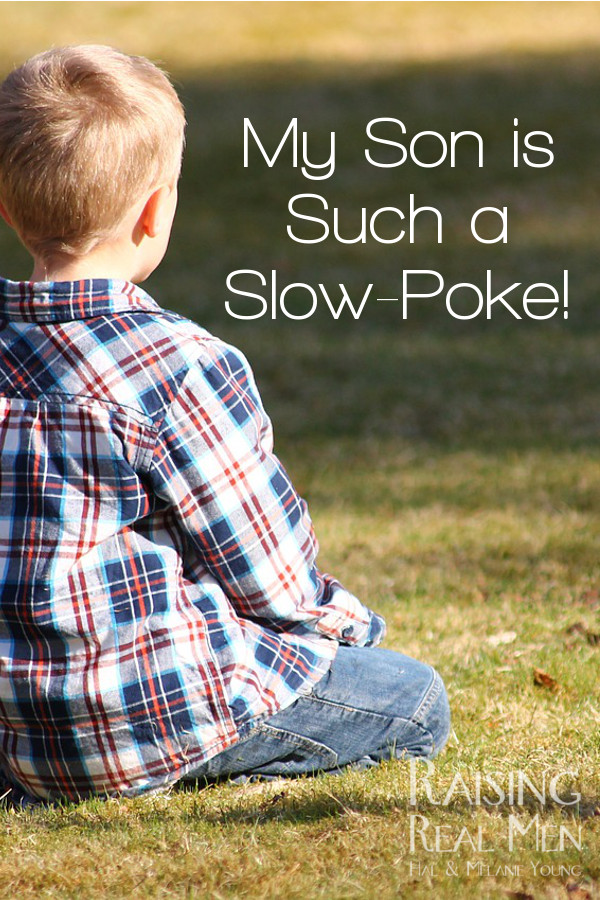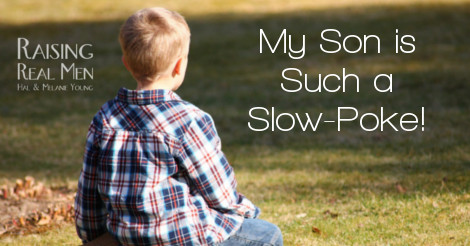Q&A: What About A Boy Who’s A Slowpoke?
Erin asked a great question on our Open Wall Friday post, “One of our sons (almost 6) is a “slow-ski”. He is far from the youngest and always the last to put on his shoes, coat, come to the table, walk into the grocery store, keep up with the group, get out of the van or buckle up. This doesn’t come from inability. Nagging and encouragement when he’s not the last isn’t helping the situation, and we would love to motivate him to do his best to show some initiative here. It gets to the point of danger when he’s always lagging behind our large group in parking lots and crossing streets, and we have to divert our attention to calling out his name to keep on task. Any thoughts or advice?”
This is one of those personality quirks which can irritate others to the point of explosion! We answered another question about an older son who didn’t manage his time well as a young adult. This sort of slowness goes beyond simple appointment keeping – it’s a whole lifestyle slowed to a crawl!
What is he gaining by being slow? Is he simply distracted and daydreaming? Is it a desire to move at his own pace, regardless of other people? Is he trying to gain attention in some way? Or is a sort of passive aggression? Understanding the reason doesn’t mean ignoring or excusing the behavior — but it may give you some ideas how to deal with it!
Remove any obstacles which might be enabling this behavior. Be sure if there’s a deadline or departure time, it’s clearly communicated to him in particular – with eye contact and calling him by name! You know by now he either doesn’t notice when he needs to speed up … or he doesn’t care. Don’t give him the excuse that he doesn’t know!
Give him real-life consequences. We arrived at church one summer morning to find one of our leaders walking in with his family — with one pre-teen son in dress clothes but totally barefoot. His dad shrugged and said, “He didn’t put his shoes away and couldn’t find them at the last minute, and we told him, ‘Too bad, it’s time for the family to leave now — Get in the van!'”
You might look for opportunities where his slowness costs him something. If dragging his feet means he doesn’t get to go to a movie, or misses a trip to the library or the mall with the family, or something like that – sometimes that will start to wake him up. We’ve had to be careful, though, that our discipline of our own children doesn’t cause trouble for other families – for example, when a team or project meeting is depending on him being there, even if he’s late!
Do what you have to do to keep him and the family safe. Your parking lot illustration is a good example – if he’s as distracted as he is slow, he’s a danger to himself. And you’re right, if you’re responsible for a whole group, the extra attention needed to keep up with him could take your eyes off the risks to the rest. You
Sometimes slowness comes from too-perfectionism. When I was learning cursive in in the second grade, I took great pride in how perfectly my letters were formed. When I got to third grade, though, I started losing points on my grade because I wrote too slowly to finish the exercises! One of our family friends complained that she couldn’t cook with her adult son–a newly qualified doctor–because he chopped vegetables with a surgeon’s precision–slowly. Perfectionism is a tricky thing because of course we want to do good work – but sometimes, the need is not “perfection” but “performance.” We need to teach our kids to judge when it’s important to be super-exact, and when it’s better to be “good enough” – and finished on time!
Challenge him to a little more hustle – and reward it. When our sons reach middle school, they often become very distracted and slow-as-Christmas with their schoolwork. We discovered that putting a timer on their work helped them focus … and made a bit of a game of it. You can offer some small incentive, a gummi bear maybe, if he beats his previous best time – whether it’s finishing a math worksheet, or taking out the trash, or getting dressed and downstairs for breakfast.
Keep in mind that sometimes we get too impatient over a child who’s too slow. There is such a thing as temperament, and while some of us are very relaxed, others are very compulsive. We shouldn’t mistake our over-reaction for something which is only the child’s problem! But eventually we all have to work with all kinds of people, whether it means we personally need to step lively … or slow the pace a bit. But it’s best to learn the self-control and social awareness to be able to choose the tempo which is appropriate for the situation!
In Christ,
Hal and Melanie
Do you get the Raising Real Men News & Update? Our weekly newsletter will keep you informed, entertained, and encouraged about teaching and appreciating your sons — and let you know about members-only deals and discounts on great things for your whole family!
Plus if you sign up with this link, we’ll give your our popular workshop which can give you new insights about what makes your son tick – the reasons God made him that way – and how you can become a more effective (and joyful) parent of boys. And it’s free!


